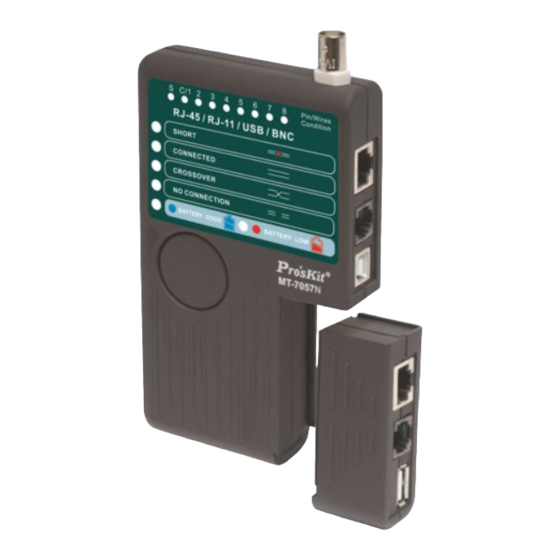
Summary of Contents for ProsKit MT-7057N
- Page 1 Test Equipment Depot - 800.517.8431 99 Washington Street - Melrose, MA 02176 TestEquipmentDepot.com CABLE SNIFFER-REMOTE MT-7057N User’s Manual Edition 2016 ©2016 Copy Right by Prokit’s Industries Co., Ltd.
-
Page 2: Table Of Contents
Contents INTRODUCTION ……………..……………..2 SAFETY and WARNING………..………..…..2 PRODUCT FEATURES …………………..…..5 SPECIFICATIONS.……………………….…..6 FRONT PANEL……………………………...…6 ACCESSORIES..………………………..…..7 OPERATION..……………………………….…..8 CABLE REPAIRE…..…………………………12 MAINTENANCE……………………………….16... -
Page 3: Introduction
INTRODUCTION The 4 in 1 CABLE SNIFFER-REMOTE provides 4 common LAN and computer cables test. It tests installed cables or patch cords with RJ-45, RJ-11, USB, and BNC connectors. It is intended to test cables with straight through connections not cables with reversed or transposed connections like some LAN crossover cables or reverse wired telephone cables. - Page 4 user. Follow the recommendations of any Trade Organizations or Regulatory Agencies whose scope encompasses the use of this tester failure to do so may result in damage to the tester or injury to the user. Do not open this tester for maintenance without first disconnecting it from all external circuitry.
- Page 5 such as rain snow, fog, or locations with steam, explosive gases or dusts. 11. Do not use tester in condensing atmospheres. That is, do not use tester in conditions where ambient temperature and humidity could cause condensation of water inside of the tester. 12.
-
Page 6: Product Features
computer monitors, etc.). The tester may display readings that are in error. 19. Avoid usage near strong RF fields (radio or television transmitters, walkie talkie, cellular phones etc.).The tester may display reading that is in error. 20. Remove the battery when the tester may be left unused for longer than month. -
Page 7: Specifications
SPECIFICATIONS 1. Cables Tested: UTP and STP LAN cables Terminated in RJ-45 male connectors. (EIA/ TIA 568)RJ-11 cables with male connectors, 2 to 6 connectors installed. USB cables with Type A flat plug on one end and type B square Plug on other end. -
Page 8: Accessories
ACCESSORIES: RJ45 to BNC female connector Instruction manual Pouch bag... -
Page 9: Operation
OPERATION 1. General information: the cable sniffer-remote performs its tests when the single button on its front panel is pressed and released.6 Status LEDs indicate the condition of the cable being tested, as well as informing the user that power is turned on, and that the battery is good (or bad).8 additional connection LEDs light to indicate that specific wires in a cable are connected. - Page 10 the same location. Usually, but not always, these cables are less than 25ft in length, and are not installed in a wall or ceiling. Since both ends are accessible, one end can be plugged into the Main unit, and another end into the Remote unit.
- Page 11 is pressed. If the “BATTERY GOOD” LED does not light, replace the battery. 6.2 Low Battery Indicator: When the “BATTERY LOW” LED light on, replace the battery. 6.3 No connection LED/Single Beep If the Remote is not connected to the main unit with a cable, or the cable has no intake conductors, the “NO CONNECTION”...
- Page 12 connections, or as many as 6 connections. For 2 connection cables, LED 3 and 4 must light .For 4 connection cables, LED 2,3,4, and 5 must light. For 6 connection cables, LED 1, 2,3,4,5, and 6 must light. The numbered LEDs do not indicate that a good connection exists, only that a connection exists.
-
Page 13: Cable Repaire
CABLE REPAIR General information: The following section provides information to the user about common cable types, common failures and repairs. It is not meant to be an exhaustive study of the topic, just some basic information that the uninitiated may find helpful. Cable damage: When a cable tests badly, either the wire of the connectors or both may be... - Page 14 4. Cables with molded on ends: Many cables have molded on ends that cannot be opened up for repair. The entire cable must be replaced, or the molded on end removed and replaced with a user serviceable connector .These types of cables usually fail from Opens or Shorts.
- Page 15 6.1. The Cable Sniffer-Remote indicates the cable is not working, but my LAN works OK: Installed LAN cables with RJ-45 connectors that have been in service and working OK may test as Open, Shorted, or Crossed. Here’s why---The EIA/TIA 568 standard for LAN cable only uses 4 of the wires in the eight-wire cable.
- Page 16 cable is tried on the LAN, it does not work .This is because the lack of the proper pairing causes excessive cross talk in the cable, preventing the LAN from working. This type of cable fault is sometimes call a split pair or double split pair to detect this type of fault, a more sophisticated tester capable of performing a NEXT test(Near End Cross Talk)
-
Page 17: Maintenance
telephone cables with RJ-11 plugs/jacks are wired inverse. The CABLE SNIFFER-REMOTE will show that a cable like this is crossed. A cable like this reverses the polarity of the telephone line. Most regular telephones made in the last 10 years are not polarity sensitive.




Need help?
Do you have a question about the MT-7057N and is the answer not in the manual?
Questions and answers